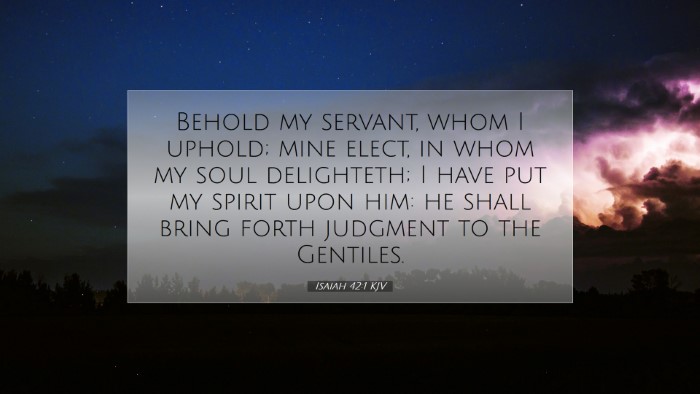Bible Commentary on Isaiah 42:1
Verse Text: “Behold my servant, whom I uphold; mine elect, in whom my soul delighteth; I have put my spirit upon him: he shall bring forth judgment to the Gentiles.”
Introduction
Isaiah 42:1 serves as a pivotal verse in the Book of Isaiah that introduces a significant theme regarding the servant of the Lord. Throughout Isaiah, the identity and mission of this servant are explored, reflecting both Israel's calling and the future Christological fulfillment. This commentary synthesizes insights from acclaimed public domain commentators to provide depth and understanding.
The Identification of the Servant
Matthew Henry describes the servant as someone who embodies the qualities of divine patience and choice, emphasizing that God actively upholds this servant. The term "servant" signifies a role of humble obedience and active engagement in God's purposes.
Albert Barnes elaborates on the concept of being "mine elect" or "chosen." This selection indicates a special status bestowed by God, underscoring the significance of this figure for the messianic expectation. The use of "my soul delighteth" suggests a profound affection and approval from God, reminiscent of the designation of Jesus at His baptism (Matthew 3:17).
Adam Clarke notes that the phrase communicates a relationship marked by favor and divine presence. The servant is not just an ordinary figure; He is appointed and empowered to accomplish God's will in a way that brings justice and righteousness.
The Empowerment of the Servant
The mention of "I have put my spirit upon him" is critical, as it highlights the divine empowerment granted to the servant. Matthew Henry states that this bestowing of the Spirit signifies an anointing, equipping the servant for His task, similar to how the prophets of old were empowered to deliver God’s messages.
Albert Barnes further reflects on the prominence of the Holy Spirit in the life of the servant, indicating that His ministry will be one of spiritual authority and enablement. This has a profound implication for understanding the workings of the Spirit in Jesus’ ministry and the ongoing work in the church today.
The Mission of the Servant
The mission to "bring forth judgment to the Gentiles" indicates a proclamation that extends beyond the nation of Israel to the entire world. Matthew Henry perceives this as a demonstration of God's universal reach and mercy, indicating that the servant's work is not limited to a single people but aims at bringing divine justice to all humanity.
Adam Clarke emphasizes that this judgment refers not merely to condemnation but to the establishment of righteousness and justice. The term “Gentiles” reflects the inclusion of all nations in God's redemptive plan, a central theme in the prophetic literature and ultimately fulfilled in Christ.
Theological Implications
More than a historical figure, the servant of Isaiah 42:1 foreshadows the coming of Christ. Albert Barnes argues that the characteristics presented manifest in Jesus’ life and ministry, revealing the theological richness of seeing Jesus as the ultimate fulfillment of this prophecy. He embodies the servant's role, being loved by God and empowered by the Spirit to advocate for justice.
Matthew Henry emphasizes understanding this passage within the larger narrative of redemption, where the servant represents both the faithful remnant of Israel and the coming Messiah. The duality of Israel's identity as both servant and suffering individual resonates through the Gospel narrative.
Practical Applications
The implications of Isaiah 42:1 for pastors and theologians are significant. Understanding Jesus as the fulfillment of this promise challenges the church to embrace the aspects of service and justice. Adam Clarke encourages readers to reflect on how they can embody such servant leadership in their communities today, emphasizing stewardship over societal issues echoing the servant's mission.
- Embrace Servanthood: As followers of Christ, the call is to emulate the servant's characteristics—humility, obedience, and divine empowerment.
- Advocacy for Justice: Churches are reminded of their responsibility to advocate for social justice and righteousness that transcends cultural and national boundaries.
- Empowerment by the Holy Spirit: Believers should seek to be filled with the Spirit, just as the servant was, to carry out God’s mission effectively.
Conclusion
Isaiah 42:1 encapsulates themes of divine choice, empowerment, and mission that resonate across the Biblical narrative. Through the lenses of Matthew Henry, Albert Barnes, and Adam Clarke, readers are invited to not only understand the text's original intent but to apply its powerful truths in their lives. This passage stands as a testament to God’s intricate plan for salvation, prefiguring the comprehensive work of Christ and extending an invitation to join in this divine mission for justice and mercy.


